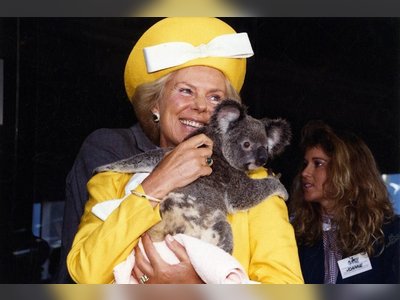The Fashion Designer Who Became an Italian Symbol: Giorgio Armani Has Died at 91
Italian fashion icon Giorgio Armani has died at the age of 91. His fashion house confirmed he passed away peacefully, surrounded by loved ones, after decades of redefining men’s and women’s fashion worldwide.
Fashion designer Giorgio Armani has died at the age of 91.
In a statement released today (Thursday) by his fashion house, it was announced: "With endless sorrow, the Armani Group announces the death of its founder and driving force, Giorgio Armani.
Mr. Armani, as he was always respectfully and admiringly called by his employees and partners, passed away peacefully, surrounded by his loved ones.
He worked tirelessly until his final days, dedicating himself to the company, its collections, and the many projects bearing his name."
The announcement followed a period of declining health, during which Armani was forced to miss the most recent men’s fashion show in Milan—an unprecedented absence in his long career.
His casket will be placed this coming Saturday and Sunday in the funeral hall in Milan, and later a private funeral will be held at his request.
Italy’s Prime Minister Giorgia Meloni paid tribute to the iconic designer: "With his elegance and creativity, he brought brilliance to Italian fashion and influenced the entire world.
An icon, a tireless worker, a symbol of the very best of Italy.
Thank you for everything." Designer Donatella Versace also wrote: "The world has lost a giant.
He made history and will be remembered forever."
Giorgio Armani was born in July 1934 in Piacenza, northern Italy, to a father who worked as a messenger and a homemaker mother.
As a young man, he studied medicine at the University of Milan but abandoned his studies after two years to serve in the army—a turning point in his life.
After his release in 1957, Armani began working at the La Rinascente department store near Milan’s Duomo Cathedral as a window dresser.
His refined taste and ability to anticipate what people wanted to wear led to his rapid promotion.
Before establishing the brand that bore his name in 1975, Armani worked during the 1960s for designer Nino Cerruti, where he learned the principles of tailoring and design.
In 1970 he began working as a freelance designer for various brands.
Only at the age of 41 did he, together with Sergio Galeotti—his romantic and business partner—found the Giorgio Armani company, which started with just ten thousand dollars in capital and today is worth about eleven billion dollars.
While Armani was the creative force and public face of the company, Galeotti managed its operations and finances until his death from AIDS-related complications in 1985.
“We met outside a nightclub while I was on vacation,” Armani once recalled.
“I saw Sergio and immediately fell in love with his Tuscan smile.
When he died, a part of me died with him.
I am still in shock that I found within myself the strength to endure such immense pain.
I had to summon all my willpower to deal with the agony.
I spent an entire year at his bedside in the hospital.
All this happened just as our career was taking off—we were becoming famous, building the company, gaining international acclaim.
It was the moment when I had finally gained confidence, and then this blow struck me.”
Armani’s first message as a designer was revolutionary: to remove formality and rigidity from men’s fashion.
At a time when Italian fashion was full of extravagant, flashy garments, Armani offered something entirely different—soft elegance, exceptional comfort, and clean design.
He was one of the first designers to strip men’s suits of stiff padding, creating flowing lines that emphasized the natural body rather than concealing it, while incorporating soft fabrics such as silk, cashmere, and fine wool in neutral tones.
Beyond comfort and harmonious colors, his suits represented a quiet revolution: new, democratic uniforms that avoided displays of status through rigid structures or luxurious fabrics, instead offering a softer, more egalitarian design language.
In 1980, Armani showcased this style to the masses when he was chosen to design the costumes for the film "American Gigolo," starring Richard Gere and Lauren Hutton.
The film portrayed men’s suits not as formal office attire, but as sexy and elegant clothing suited to a modern lifestyle—a new kind of man.
The suits featured soft, flowing lines in subdued shades like beige and gray.
The film catapulted Armani to global fame, and he became Hollywood’s official designer, later creating costumes for films and television series including "The Untouchables" and "Miami Vice."
His designs are still considered a turning point in the history of men’s fashion.
At his Milan museum, visitors can see his celebrated creations over the decades, with the ground floor dedicated to rotating exhibitions.
Among his iconic collections, his tailored designs stand out—especially the women’s spring-summer 1995 collection, regarded as one of his greatest successes.
In that collection, Armani subtly integrated Asian aesthetics with wide, flowing cuts reminiscent of Japanese kimonos, Chinese collars, and smooth fabrics like silk and chiffon, evoking Zen sensibilities and ceremonial dress of the Far East.
To avoid overt exoticism, Armani translated these influences into a minimalist and soft design language.
The result was a quiet collection that introduced Eastern spirit as an integral part of his vision—defined by restraint, balance, and understated elegance.
Armani’s story is one of both design and economic success, rivaling major fashion houses like Dior, Versace, and Prada.
More than just clothing and home design, Armani became synonymous with a stylish lifestyle: from his luxurious yet functional homes, to hotels that brought this experience to the public, to his summer retreats in Antigua and on Pantelleria near Sicily, where he spent three to six weeks each summer with friends and family.
His ambition to reach a wider audience led him to create a hierarchy of designs and prices.
Alongside the main Giorgio Armani line and the haute couture Armani Privé line—celebrating its twentieth anniversary this year—he developed sub-brands that expressed his design language in different variations and price ranges: from luxury to affordable.
These included Emporio Armani, Armani Exchange, and the sports line EA7, which outfits Italy’s national football team and, since 2006, the country’s Olympic and Paralympic delegations.
He also built a wide-ranging beauty and fragrance line.
Despite being perhaps the most famous Italian designer in the world, Armani’s private life remained enigmatic for many years.
Only at the age of ninety, in an interview with the Italian daily "Corriere della Sera," did he speak at length about his personal life and the men beside him.
“I never spoke about it,” he said of his first love for a man, as a teenager at a summer camp.
“It happened under a beach shelter in Misano at five in the afternoon, when all the boys at camp were meant to be calm.
There was a young supervisor I immediately felt drawn to.
I did not fully understand it and did not pursue it, but from that moment my life took a turn.
At that time I did not distinguish between men and women—it was simply attraction, something beautiful.
I could not wait to be near him, for him to touch me.
I felt an immense connection, and it remains a deeply emotional memory for me.”
In the annals of history, Armani will be remembered as the man who changed how men dress—removing unnecessary formality and creating suits suited to a modern lifestyle.
He recognized the profound shift then underway in men’s fashion, and today most men’s suits worldwide bear his influence.
In women’s fashion, too, Armani sparked a revolution.
His soft power suits of the 1980s helped an entire generation of women enter the business world with confidence, recognizing that they needed clothing that conveyed authority and strength without erasing their femininity.
In this way, every suit he designed became a tool for self-expression and personal confidence.
In a statement released today (Thursday) by his fashion house, it was announced: "With endless sorrow, the Armani Group announces the death of its founder and driving force, Giorgio Armani.
Mr. Armani, as he was always respectfully and admiringly called by his employees and partners, passed away peacefully, surrounded by his loved ones.
He worked tirelessly until his final days, dedicating himself to the company, its collections, and the many projects bearing his name."
The announcement followed a period of declining health, during which Armani was forced to miss the most recent men’s fashion show in Milan—an unprecedented absence in his long career.
His casket will be placed this coming Saturday and Sunday in the funeral hall in Milan, and later a private funeral will be held at his request.
Italy’s Prime Minister Giorgia Meloni paid tribute to the iconic designer: "With his elegance and creativity, he brought brilliance to Italian fashion and influenced the entire world.
An icon, a tireless worker, a symbol of the very best of Italy.
Thank you for everything." Designer Donatella Versace also wrote: "The world has lost a giant.
He made history and will be remembered forever."
Giorgio Armani was born in July 1934 in Piacenza, northern Italy, to a father who worked as a messenger and a homemaker mother.
As a young man, he studied medicine at the University of Milan but abandoned his studies after two years to serve in the army—a turning point in his life.
After his release in 1957, Armani began working at the La Rinascente department store near Milan’s Duomo Cathedral as a window dresser.
His refined taste and ability to anticipate what people wanted to wear led to his rapid promotion.
Before establishing the brand that bore his name in 1975, Armani worked during the 1960s for designer Nino Cerruti, where he learned the principles of tailoring and design.
In 1970 he began working as a freelance designer for various brands.
Only at the age of 41 did he, together with Sergio Galeotti—his romantic and business partner—found the Giorgio Armani company, which started with just ten thousand dollars in capital and today is worth about eleven billion dollars.
While Armani was the creative force and public face of the company, Galeotti managed its operations and finances until his death from AIDS-related complications in 1985.
“We met outside a nightclub while I was on vacation,” Armani once recalled.
“I saw Sergio and immediately fell in love with his Tuscan smile.
When he died, a part of me died with him.
I am still in shock that I found within myself the strength to endure such immense pain.
I had to summon all my willpower to deal with the agony.
I spent an entire year at his bedside in the hospital.
All this happened just as our career was taking off—we were becoming famous, building the company, gaining international acclaim.
It was the moment when I had finally gained confidence, and then this blow struck me.”
Armani’s first message as a designer was revolutionary: to remove formality and rigidity from men’s fashion.
At a time when Italian fashion was full of extravagant, flashy garments, Armani offered something entirely different—soft elegance, exceptional comfort, and clean design.
He was one of the first designers to strip men’s suits of stiff padding, creating flowing lines that emphasized the natural body rather than concealing it, while incorporating soft fabrics such as silk, cashmere, and fine wool in neutral tones.
Beyond comfort and harmonious colors, his suits represented a quiet revolution: new, democratic uniforms that avoided displays of status through rigid structures or luxurious fabrics, instead offering a softer, more egalitarian design language.
In 1980, Armani showcased this style to the masses when he was chosen to design the costumes for the film "American Gigolo," starring Richard Gere and Lauren Hutton.
The film portrayed men’s suits not as formal office attire, but as sexy and elegant clothing suited to a modern lifestyle—a new kind of man.
The suits featured soft, flowing lines in subdued shades like beige and gray.
The film catapulted Armani to global fame, and he became Hollywood’s official designer, later creating costumes for films and television series including "The Untouchables" and "Miami Vice."
His designs are still considered a turning point in the history of men’s fashion.
At his Milan museum, visitors can see his celebrated creations over the decades, with the ground floor dedicated to rotating exhibitions.
Among his iconic collections, his tailored designs stand out—especially the women’s spring-summer 1995 collection, regarded as one of his greatest successes.
In that collection, Armani subtly integrated Asian aesthetics with wide, flowing cuts reminiscent of Japanese kimonos, Chinese collars, and smooth fabrics like silk and chiffon, evoking Zen sensibilities and ceremonial dress of the Far East.
To avoid overt exoticism, Armani translated these influences into a minimalist and soft design language.
The result was a quiet collection that introduced Eastern spirit as an integral part of his vision—defined by restraint, balance, and understated elegance.
Armani’s story is one of both design and economic success, rivaling major fashion houses like Dior, Versace, and Prada.
More than just clothing and home design, Armani became synonymous with a stylish lifestyle: from his luxurious yet functional homes, to hotels that brought this experience to the public, to his summer retreats in Antigua and on Pantelleria near Sicily, where he spent three to six weeks each summer with friends and family.
His ambition to reach a wider audience led him to create a hierarchy of designs and prices.
Alongside the main Giorgio Armani line and the haute couture Armani Privé line—celebrating its twentieth anniversary this year—he developed sub-brands that expressed his design language in different variations and price ranges: from luxury to affordable.
These included Emporio Armani, Armani Exchange, and the sports line EA7, which outfits Italy’s national football team and, since 2006, the country’s Olympic and Paralympic delegations.
He also built a wide-ranging beauty and fragrance line.
Despite being perhaps the most famous Italian designer in the world, Armani’s private life remained enigmatic for many years.
Only at the age of ninety, in an interview with the Italian daily "Corriere della Sera," did he speak at length about his personal life and the men beside him.
“I never spoke about it,” he said of his first love for a man, as a teenager at a summer camp.
“It happened under a beach shelter in Misano at five in the afternoon, when all the boys at camp were meant to be calm.
There was a young supervisor I immediately felt drawn to.
I did not fully understand it and did not pursue it, but from that moment my life took a turn.
At that time I did not distinguish between men and women—it was simply attraction, something beautiful.
I could not wait to be near him, for him to touch me.
I felt an immense connection, and it remains a deeply emotional memory for me.”
In the annals of history, Armani will be remembered as the man who changed how men dress—removing unnecessary formality and creating suits suited to a modern lifestyle.
He recognized the profound shift then underway in men’s fashion, and today most men’s suits worldwide bear his influence.
In women’s fashion, too, Armani sparked a revolution.
His soft power suits of the 1980s helped an entire generation of women enter the business world with confidence, recognizing that they needed clothing that conveyed authority and strength without erasing their femininity.
In this way, every suit he designed became a tool for self-expression and personal confidence.










